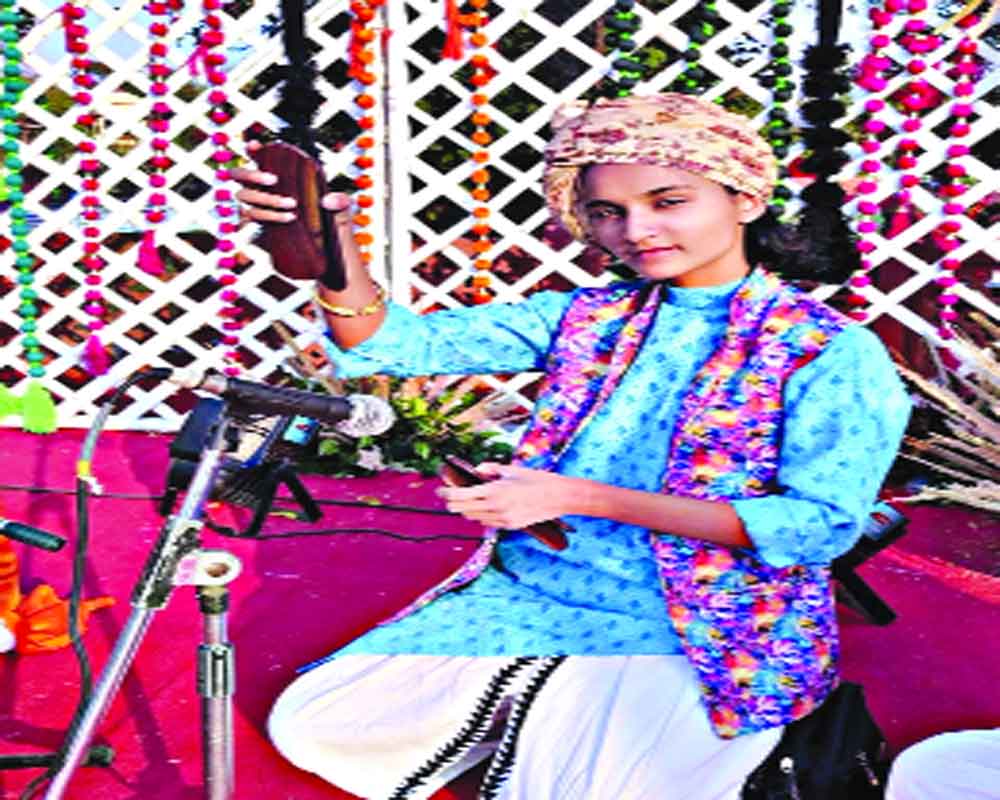Music is passion for Mamata Sapera, and she plays many traditional instruments on stage, while breaking glass ceiling
A typical folk performance from Rajasthan took place at Jaipur’s Jawahar Kala Kendra, with musicians wearing colourful Rajasthani turbans playing various instruments – harmonium, khartal, bhapang, morchang, dafli and the likes. The classic vibe of a regular folk performance from the desert state – colourful, rooted, melodious and soul-stirring – filled the air.
A turbaned young face played the morchang. He wasn’t a man. She was 18-year-old Mamta Sapera. Mamta, from the Kalbeliya tribe known for the performing arts, believes in taking her community’s art forward but not through the regular route.
As a child, she was trained in the Kalbeliya dance, typically associated with women of her community, by her mother. She has performed, too. But, the visit of a musician relative altered Mamta’s course. “A relative was visiting my home. Since I was always intrigued by the instruments he played, I asked him to teach me something about them. He bluntly refused and told me, girls do not play instruments. This upset me no end. So, on my 15th birthday that year, I asked my father for the morchang, khartal and bhapang as gifts. My father agreed to give them to me,” Mamta shared.
Her father set a challenge. He asked her to perform on a stage within 15 days. “I told him I was not ready yet. But he was not convinced. I accepted the challenge. I felt very good when I was up on the stage, playing the morchang and I received appreciation from everyone. That was my beginning!” said Mamta, who has recently completed her Class XII. She wants to be a graduate in music.
In the past three years, Mamta added many more instruments to her prowess. She learnt to play the drum, kazoo and harmonium, besides the traditional instruments that she was practising. She also learnt to play the violin and took beatboxing lessons. While it usually takes six months of practice to play an instrument, Mamta did it in 15 days!
She comes from a family of performing artists. Her brothers sing and play instruments. Her father plays the bean and organises folk performances, and her mother
is a noted dancer herself. Everyone in her extended family is a performer as well. It is through multiple shows and performances all over the country that Mamta’s family came out of living in tents and now owns a house in Jaipur.
“In the beginning, it was not that I wanted only to learn to play instruments. I was into Kathak, besides Kalbeliya dance. But my relative’s comment got into me. I decided that not one or two, I will play as many instruments as possible. I wanted to show people that girls can play whichever instrument they want! And, we can do what we want! The same people who discouraged me earlier now compliment me,” said Mamta.
Mamta has performed all across the country and what she enjoys the most is jugalbandi. “It was a defining moment in my life when I played the khartal and morchang with my idol, the folk artist Ghazi Khanji. I used to learn techniques watching his shows and videos and wanted to emulate him. It was such an honour when he complimented me on my art,” she said.
Her jugalbandi with Carnatic musicians is vivid in her memories. “It was a beautiful communication between folk beats and Carnatic melody. After half-an-hour, we began to understand each other’s music,” she said.
She also recalled a performance experience when her tongue started bleeding. “I love the morchang because it is the smallest and toughest-to-play instrument. I was doing a show a few months ago and I didn’t realise that my tongue had started bleeding. When we play, the entire head region goes numb. Some members of the audience came up on the stage and asked me to stop. I gestured to them that I will stop only when I complete the piece,” Mamta shared.
The young torchbearer of the Kalbeliya community rues the fact that they don’t sing the old-time songs anymore. “There were songs about our life in the tents, about longing for loved ones living elsewhere… The present generation doesn’t know them. Today, they mix the sound and the purity isn’t preserved. People should know these stories of our collective past. I would want to revive those songs,” said Mamta.
Mamta wants to create a space for girls. “I want to start a studio where girls can learn to play instruments. No one will tell them what they should not do. I am currently working with a few girls, training them to play the khartal as and when I meet them,” she stated.
Mamta is also against gender stereotyping. “I don’t like gender taboos. I like to wear kurta-pyjama and safas, so I wear them,” said the feisty young woman.
(The author is freelance journalist)


























